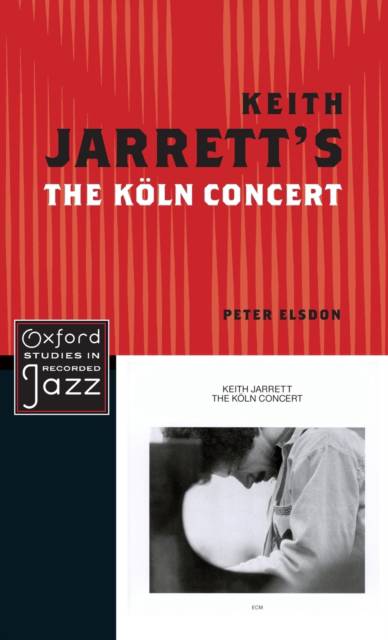
Door een staking bij bpost kan je online bestelling op dit moment iets langer onderweg zijn dan voorzien. Dringend iets nodig? Onze winkels ontvangen jou met open armen!
- Afhalen na 1 uur in een winkel met voorraad
- Gratis thuislevering in België vanaf € 30
- Ruim aanbod met 7 miljoen producten
Door een staking bij bpost kan je online bestelling op dit moment iets langer onderweg zijn dan voorzien. Dringend iets nodig? Onze winkels ontvangen jou met open armen!
- Afhalen na 1 uur in een winkel met voorraad
- Gratis thuislevering in België vanaf € 30
- Ruim aanbod met 7 miljoen producten
Zoeken
€ 148,45
+ 296 punten
Uitvoering
Omschrijving
Keith Jarrett ranks among the most accomplished and influential pianists in jazz history. His The Köln Concert stands among the most important jazz recordings of the past four decades, not only because of the music on the record, but also because of the remarkable reception it has received from musicians and lay-listeners alike. Since the album's 1975 release, it has sold over three million copies: a remarkable achievement for any jazz record, but an unprecedented feat for a two-disc set of solo piano performances featuring no well-known songs.
In Keith Jarrett's The Köln Concert, author Peter Elsdon seeks to uncover what it is about this recording, about Keith Jarrett's performance, that elicits such success. Recognizing The Köln Concert as a multi-faceted text, Elsdon engages with it musically, culturally, aesthetically, and historically in order to understand the concert and album as a means through which Jarrett articulated his own cultural and musical outlook, and establish himself as a serious artist. Through these explorations of the concert as text, of the recording and of the live performance, Keith Jarrett's The Köln Concert fills a major hole in jazz scholarship, and is essential reading for jazz scholars and musicians alike, as well as Keith Jarrett's many fans.
In Keith Jarrett's The Köln Concert, author Peter Elsdon seeks to uncover what it is about this recording, about Keith Jarrett's performance, that elicits such success. Recognizing The Köln Concert as a multi-faceted text, Elsdon engages with it musically, culturally, aesthetically, and historically in order to understand the concert and album as a means through which Jarrett articulated his own cultural and musical outlook, and establish himself as a serious artist. Through these explorations of the concert as text, of the recording and of the live performance, Keith Jarrett's The Köln Concert fills a major hole in jazz scholarship, and is essential reading for jazz scholars and musicians alike, as well as Keith Jarrett's many fans.
Specificaties
Betrokkenen
- Auteur(s):
- Uitgeverij:
Inhoud
- Aantal bladzijden:
- 192
- Taal:
- Engels
- Reeks:
Eigenschappen
- Productcode (EAN):
- 9780199779253
- Verschijningsdatum:
- 31/12/2012
- Uitvoering:
- Hardcover
- Formaat:
- Genaaid
- Afmetingen:
- 218 mm x 145 mm
- Gewicht:
- 331 g

Alleen bij Standaard Boekhandel
+ 296 punten op je klantenkaart van Standaard Boekhandel
Beoordelingen
We publiceren alleen reviews die voldoen aan de voorwaarden voor reviews. Bekijk onze voorwaarden voor reviews.











